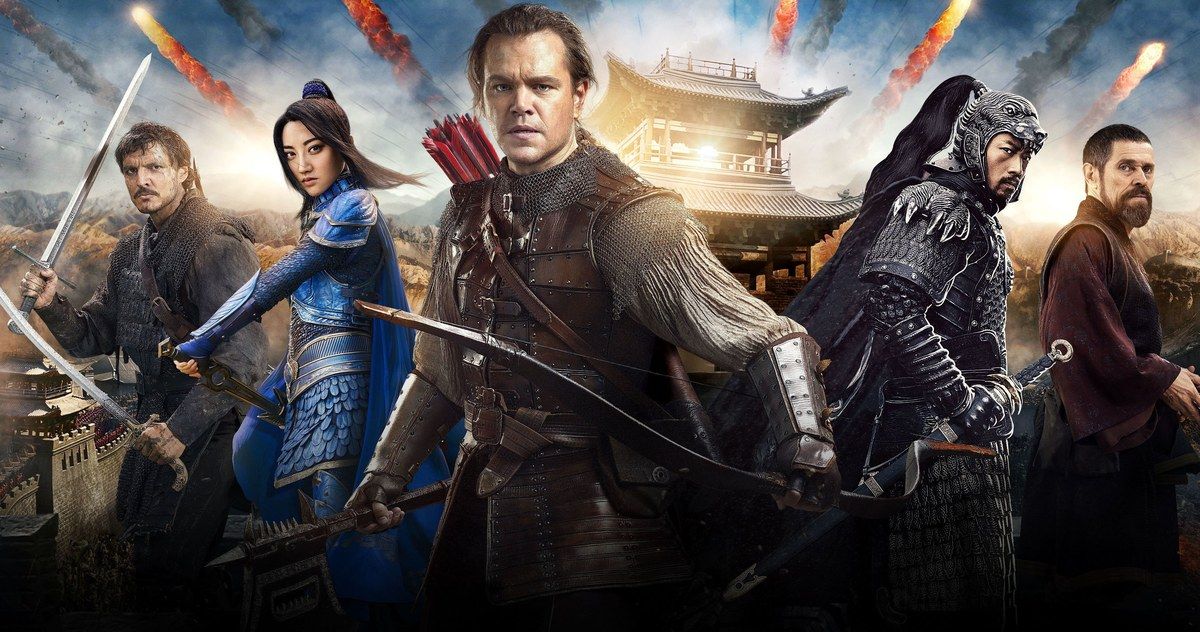The big-budget epic The Great Wall was billed as the largest ever co-production between the U.S. and China, with Legendary Pictures and its distribution partner Universal Pictures equally financing the $150 million movie with Chinese-based companies China Film Group and Le Vision Pictures. It seems that The Great Wall may also be the last U.S.-China co-production, with the film tanking at the domestic box office with just $34.8 million from just two weeks in theaters. A new report claims that Legendary will lose $75 million from the film, with Universal losing $10 million as well, putting the future of U.S. and China co-productions at risk.
The Hollywood Reporter reveals that, while Legendary, Universal, China Film Group and Le Vision Pictures each financed 25% of the film, Universal was solely responsible for the global marketing budget, which is, "conservatively estimated at $80 million-plus." The big-budget action thriller opened first in China back in December, hitting big with $60.5 million, the third highest debut in China last year, behind Legendary's Warcraft ($65.1 million) and Stephen Chow's The Mermaid ($120.4 million), which became the country's highest-grossing movie in history with $526.8 million. Despite a big opening, it only ended up with $170.8 million in China, with the film expected to end its box office run with $320 million, which is considered a big disappointment.
Starring global superstar Matt Damon and directed by one of the most breathtaking visual stylists of our time, Zhang Yimou (Hero, House of Flying Daggers), Legendary's The Great Wall tells the story of an elite force making a valiant stand for humanity on the world's most iconic structure. The first English-language production for Yimou is the largest film ever shot entirely in China. The Great Wall also featured an international ensemble cast including Jing Tian, Pedro Pascal, Willem Dafoe and Andy Lau. The Great Wall fell under heavy criticism for its "whitewashed" casting of Matt Damon as the lead of a film set in China.
While Legendary's losses will be substantial, Universal is in much better shape. The studio will collect a 10% distribution fee from all theatrical revenue, which accounts for between 40% and 50% of the total box office, and box office rentals is expected to recoup the previously-mentioned $80 million in marketing costs. The four financing partners will split up the rest of the box office revenue evenly. The losses may also be recouped through home entertainment releases, with "best case scenario" projections putting domestic home video at $20 million, international home video at $40 million, and TV revenues ranging between $25 million and $30 million. It isn't clear at this time if there will also be a four-way split with these revenues between the partners.
The box office failure of The Great Wall will certainly serve as a warning to most studios, likely leading to the end of any major U.S.-China co-productions. Among the many lessons learned for American studios is that it's becoming extremely hard to find stories that combine Western and Eastern elements in harmony. There were also issues with crews from both West and East, with the production reportedly hiring upwards of 100 interpreters to smooth out conflicts between American and Chinese crew members. No details were given about these alleged conflicts, or if Chinese director Zhang Yimou was involved in these disputes. Here's what one executive connected to the project had to say about how The Great Wall just didn't work.
"This was the first movie of its type. You're trying to appeal to everyone, and you're not compelling enough to appeal to anyone. It feels like Esperanto."
There are many benefits for American/Chinese co-productions, which allow financial backers to take home 43% of ticket revenue out of the country, which is much more than co-production deals in other countries. Both Transformers: Age of Extinction and Iron Man 3 were being planned as Chinese co-productions, before they backed out due to the amount of script control and production involvement on the Chinese side. Still, there are a number of U.S./China co-productions in the works, but on a smaller scale. Skydance Productions is teaming up with China-based Alibaba for a World War II drama entitled The Flying Tigers, written by Braveheart scribe Randall Wallace and the road movie Edge of the World, produced by Mark Gordon and Hawk Koch, with Pegasus and China Film Group co-producing. Other studios are going a different route, setting up financing deals to develop strictly Chinese content with local producers. Sony has signed a financing deal with Dalian Wanda Group, while Paramount signed a reported $1 billion deal with Shanghai Film Group and Huahua Media Group. Warner Bros. is also developing a dozen Chinese-language films through its own Flagship Entertainment banner, through their deal with China Media Capital.

